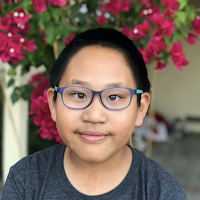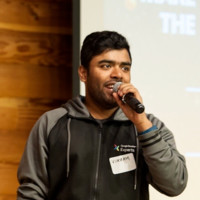
As over 400 community-led DevFest events continue to take place around the world, something is becoming clear: kids are taking over. We’re not kidding. Many young students are taking the stage this season to speak on topics ranging from machine learning to robotics, and people are loving it.
At the same time, these kids and the GDG (Google Developers Groups) community organizers of local DevFests are becoming great friends. We saw this recently at a DevFest in San Francisco, where Vikram Tiwari, a GDG Lead, and 11-year-old Aaron Ma, the youngest speaker at the event, had a great conversation on programming.
We wanted to let you in on their conversation, so we asked Vikram to answer a few questions on coding, and then asked Aaron to respond to his answers. Check out their conversation below!
What is your favorite language to code in?
Vikram: I would have to say JavaScript - it used to be the language no one cared about, and then suddenly node.js changed the whole landscape. Nowadays, you can’t escape js, it’s everywhere from browsers to IoT and now even Machine Learning. The best part about using js is the flexibility it gives you. For example, it’s easy to make mistakes in js, but then if you want to prototype quickly, it doesn’t hold you back. And of course, you can’t forget about the vibrant node.js ecosystem, which is always striving for ease of use and speed.
Aaron: Open source is definitely the move! Especially open source competitions because they’re super exciting, let me see where I need to improve, and let me test if I’ve mastered a field of study. I also like to contribute or create my own open-source projects so I can grow as an open-source minded developer. Right now, I am the youngest contributor to Google’s TensorFlow, so to all the other kids out there reading this...come join me!
Do you like jumping right into coding or thinking through every line before you write?
Vikram: I do like to think about the problem beforehand. However, if the problem has already been distilled down, then I like to get right to execution. In this case, I generally start with writing a bunch of pseudo functions, mocking the inputs and outputs of those functions, connecting them together, and then finally writing the actual logic. This approach generally helps me with context switching in a sense that I can stop working on that specific problem at any point and pick it back up from the same position when I get back to it.

Aaron: I like how you think! ?If someone has already implemented the problem and packaged it, I would try to get right to the deployment process. But if no one has implemented the problem, I would first start with writing some pseudocode, and then slowly convert the pseudocode into actual code that works.
What is your favorite part of the DevFest community?
Vikram: That DevFest is a home for all developers, from all walks of life, with all kinds of ideas. Yes, this family loves building your tech skills, but it also loves helping you breakthrough any social barriers you may face. From feeling more comfortable around people to feeling more confident with your code, this community wants to help you do it all.
Aaron: We are a DevFamily! ❤️I couldn’t agree more. My favorite part about DevFest is how this community can inspire. We, as DevFest developers, have the chance to change how we all think about CS every time we get together. From students like myself to long time experts, there is such an open and positive exchange of ideas taking place here - it’s so exciting and always makes me smile. ?
Want to join a conversation like this one? Respond to the questions yourself with the #DevFest or find a DevFest near you, at devfest.withgoogle.com.




